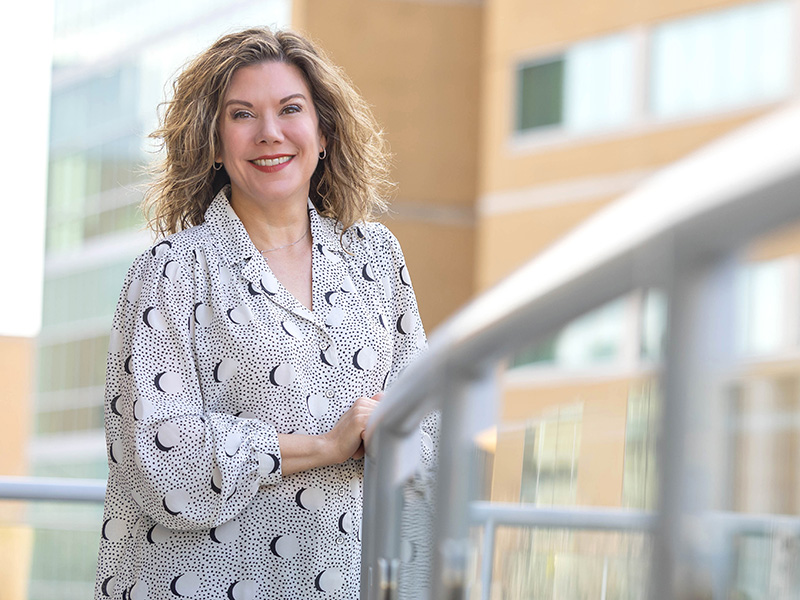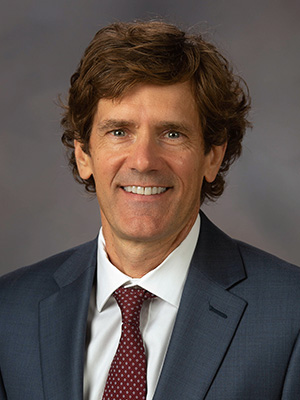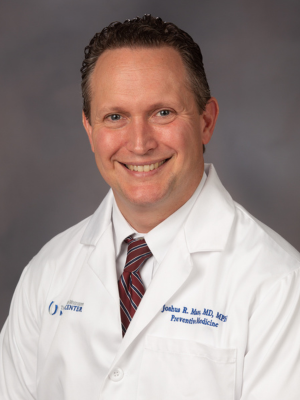Compretta juggles multiple grants, projects aimed at addressing health equity

A teaching kitchen for medical students designed to fight chronic diseases that most plague Mississippians. An outreach program that trains young Black adults to share evidence-based COVID-19 research with their peers. A project that teaches high schoolers to conduct their own public health research.
Dr. Caroline Compretta’s research projects represent a few tools by which she identifies and addresses structural and local barriers to health education and promotion. The associate professor of preventive medicine at University of Mississippi Medical Center didn’t choose a career in medical anthropology. It’s safe to say the field, which focuses on health equity, chose her.
When people ask what she does for a living, they may get either the condensed or extended version.
“The short answer is that I work at UMMC as a researcher and teacher,” says the Hattiesburg native, also a core faculty member in the Center for Bioethics and Medical Humanities. “The long answer is that I research ways to help communities, especially underserved communities, have better COVID-19 and cardiometabolic health outcomes.
“The really long answer is that I’m a medical anthropologist who examines the difference between disease and illness in medically underserved populations, where disease is your diagnosis and illness is the experience of disease.”
The latter, she explains, varies depending on socioeconomic and geographic conditions.
“I explore these issues through a health equity lens to ensure that health care is responsive to patients’ needs and to improve patient adherence.”
In doing so, she—and her team -- have had to reinvent the wheel in some ways.
“Investigators tend to think that research and community engagement are two distinct realms, but any research that is geared toward patient usage or adoption, whether therapeutic or programmatic, would benefit from community engagement,” says Compretta. “We can create the most successful treatments or programs, but if target communities don’t understand it and/or mistrust it, then researchers will face an uphill battle for adoption.”
One example is when the COVID-19 vaccine became available. Because some communities didn’t trust its safety, the state’s vaccination rates lagged others.
As principal investigator of the Mississippi Community Engagement Alliance (MS CEAL), a $4.2 million grant, Compretta and her team worked with rural and urban partners to identify and address key perceptions and behaviors related to vaccine hesitancy.
In doing so, they discovered a lot of myths, three of which were most surprising: the vaccine would cause infertility, contain microchips or lead to the apocalypse with only the non-vaccinated surviving.
“What was so surprising was that we heard such misconceptions while the death rate of non-vaccinated people continued to rise at an alarming rate.”
Also of concern was that young adults felt excluded from health promotion efforts at the start of the pandemic, despite being an age group with one of the highest infection rates.
To combat the misinformation, Compretta’s team visited communities throughout the state, armed not only with information and medical experts, but also vaccines.
Three vital need-to-know nuggets came out of that period: people need to feel they can ask questions, they need experts to listen instead of belittling and they need the experts to respond. And they did: vaccination and clinical trial participation rates among Black Mississippians are now well above national averages.

The School of Population Health is fortunate to have Compretta as part of its faculty, says Dr. Thomas Dobbs, dean. “She has broad experience in diverse population health topic areas, but in her work during COVID, in partnership with the Mississippi State Department of Health, leading UMMC's CEAL grant, the true value of population health can be appreciated.
“Mississippi is the epicenter of health disparities in the U.S. During COVID, in large measure due to her efforts and the CEAL team, Mississippi witnessed a dramatic reversal in the mortality rate among Black Mississippians. Through culturally appropriate research, listening and engagement, Mississippi was able to turn the disparity narrative upside-down, with Black Mississippians surviving the COVID pandemic at a level higher than White Mississippians.
“Only through health equity research, and subsequent intervention, will we truly be able to advance health in our state.”
That goes for nutrition, too. Because of Mississippi’s high rates of diet-related chronic diseases – diabetes, cardiovascular disease, obesity, for example -- Compretta piloted the Culinary Medicine Program Teaching Kitchen to train future physicians on helping patients eat healthier. Initially designed for first-year medical students, after overwhelmingly positive feedback, Compretta worked with Tulane Goldring Center for Culinary Medicine and registered dieticians to develop a longitudinal nutrition curriculum spanning all four years of medical school.
Plans are now underway to build a state-of-the art kitchen large enough to accommodate students across all UMMC schools and community members.
Breanna Wade, sponsored program administrator who works with Compretta on Project SCORE (Student Centered Outcomes Research Experience), an inner city after-school program funded by a $1.3 million, five-year grant, sees first-hand how her anthropology background shapes her research expertise.
“I’ve learned that the most important thing is community engagement and making sure the participants feel included, heard and valued and not just like a number in a research project,” says Wade.
“My favorite thing about Dr. Compretta is that she used to be the director for the children's program at Stewpot.” Now, years later, “every month she throws a birthday party for the kids, and every year they have a Halloween party to decorate pumpkins and a Christmas party where she brings them all a gift. She does this out of her own pocket and not for a photo-op or recognition, and it is that pure genuineness that shines bright through her connections with people and her research efforts.”
It’s also something she’s teaching her three sons, ages 14, 12 and 9, who often accompany her on outreach events. She and husband Jonathan, whom she “couldn’t do this work without,” live in Jackson with a menagerie of dogs, chickens and a bearded dragon.

Her unique background – she has a B.A. in English, M.A. and PhD in anthropology, and worked in the non-profit sector before coming to UMMC – has given Compretta a broad perspective on the needs of underserved communities, how to effectively partner with community members to address those needs, and how to integrate that perspective into an academic medical center, says Dr. Joshua Mann, professor and chair of preventive medicine.
“What makes her truly stand out is how rapidly she has risen to the ‘top of the class’ when it comes to establishing effective collaborative research relationships across Mississippi and even in neighboring states,” says Mann.
In addition to being PI on three current grants, she’s co-PI on two others, holds leadership roles at three research centers, and is busy researching and writing future projects.
Since joining UMMC in 2016 in her first full-time faculty role, Compretta has brought in nearly $6 million in research funding, joining the ranks of just 30 others over the last three decades.
Still, the grant funding she’s brought in isn’t her greatest contribution, says Mann. “I would say that the greatest long-term impact of her success will be her elevation of the visibility of community engaged research within the UMMC research community.
“Success breeds success, and I think as others see what she has been able to accomplish in this space, it will lead to more and more faculty and learners conducting community engaged and community focused work. And over the very long term, that will make a big contribution to making A Healthier Mississippi a reality.”


